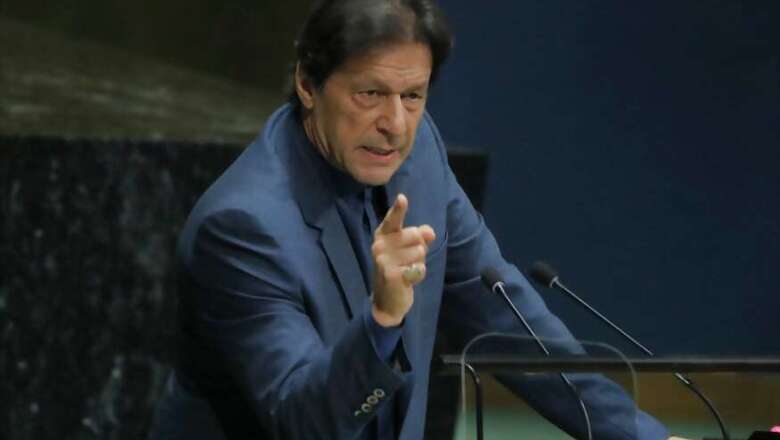
views
New Delhi: Pakistan has escaped for another four months the ‘Black List’ of the global terror watchdog, the Financial Action Task Force (FATF), but has been severely indicted for failing to deliver on most of its 27 targets and not putting a stop to terror financing.
The FATF has given Pakistan till February 2020 to put its house in order or warned that it would blacklisted.
The Paris-based FATF took the decision after its five-day plenary, which concluded in the French capital.
On Tuesday, the FATF’s International Co-operation Review Group (ICRG) discussed Pakistan’s actions for countering terror financing and anti- money laundering (CFT/AML). It decided on Friday to give Pakistan time till February 2020 to comply with the 27 points that the country had promised to deliver on in June last year.
Sources said Pakistan could comply with only five of the 27 points but was saved from the inevitable blacklist by its all-weather friend China, currently in the FATF chair.
"Strongly urge Pakistan to swiftly complete its full action plan by February 2020, otherwise should significant and sustainable progress not be made across the full range of its action plan by next Plenary, the FATF will take action, including urging members to advise their financial institutions to give special attention to business relations/transactions with Pakistan," the FATF plenary said in a statement.
By making this decision public, the FATF has given notice to the global financial institutions that they need to prepare to red flag the jurisdiction and ready their systems for the eventuality in February 2020.
Indian government officials pointed out that the evidence against Pakistan is so strong that even China couldn't save it from remaining in the ‘Grey List’, adding it is highly probable that Pakistan next year will be on the Black List.
“This language is the same as used for Iran, which is already on the Black List. Chances of Pakistan exiting the Grey List in the next few years are now reduced to nil. The possibility of a formal Black Listing in February 2020 is now highly probable," an official privy to the FATF proceedings told CNN-News18.
FATF President Xiangmin Liu also warned Pakistan in a very strongly-worded statement. “Pakistan needs to do more and faster. If by February 2020 it doesn't make significant progress, Pakistan will be put in the 'Black List’,” Xiangmin told reporters.
"The Pakistani government has demonstrated strong political will to implement its action plan," Xiangmin said. "We will provide all the necessary training and assistance, and we have called on our members and our global network to help in that regard."
Indian government sources said after the Asia Pacific Group's decision to move Pakistan to the Grey List, the country had resorted to lobbying tactics to save itself from the inevitable blacklisting by FATF.
“Political lobbying is against the laid-down procedures of FATF. Yet, Imran Khan lobbied with at least 24 countries on the sidelines of the UNGA (United National General Assembly) to save Pakistan from FATF blacklisting,” an official said.
Pakistan also took some “superficial action” against Hafiz Saaed and four terrorists of the Lashkar-e-Taiba and Jamaat-ud-Dawa -- Professor Zafar Iqbal, Yahya Aziz, Muhammad Ashraf and Abdul Salam -- on charges of terror financing. But Indian government officials pointed out how 118 terrorists, including UN-proscribed ones like the Haqqanis, Masood Azhar, Zakir Ur Rehman Lakhvi and Saeed, continue to get protection from the Pakistani state.
The 39-member FATF works on the principle of consensus and Pakistan convinced three countries — Turkey, Malaysia and China — to vote against the blacklisting proposal brought in by France, the United Kingdom and Germany.
Sources said the United States had supported the blacklisting proposal in the run-up to the Paris plenary and PM Khan had lobbied with Washington on his recent visit to the country on the sidelines of UNGA. “Ultimately, the US realised that China in the FATF chair would mean the proposal falling through,” an official said.
If Pakistan continues with the 'Grey List' or is put in 'Dark Grey' list, it would be very difficult for the country to get financial aid from the International Monetary Fund (IMF), the World Bank and the European Union, making its financial condition more precarious.
"It was again decided by consensus that the FATF would retain Pakistan on the Grey List and warn Pakistan that if it did not complete its full Action Plan and show significant and sustainable progress action will be taken," another official privy to the development said.
The FATF discussed all jurisdictions, which are under review, including Pakistan, and there was consensus on Pakistan, with its poor performance on the 27-point Action Plan, despite expiry of its 15-month timelines.
"It was noted that Pakistan was able to address only five out of 27 items. It was unanimously decided to express serious concern with overall lack of progress in addressing its transnational terror funding risks," another official said.
The FATF is an inter-governmental body established in 1989 to combat money laundering, terrorist financing and other related threats to the integrity of the international financial system. It places nations in three categories – White List, Black List and Grey List. Pakistan was placed on the Grey List by the FATF in June last year and was given a plan of action to complete it by October 2019, or face the risk of being placed on the black list with Iran and North Korea.
The moment a nation gets put in the Black List, it invites immediate economic sanctions and punishment - borrowing will become difficult, non-banking financial institutions will come under financial scrutiny and bailouts and IMF packages will become harder to access. Only two countries, North Korea and Iran, are on the FATF blacklist, which severely crimps their access to the global financial system as well as international aid.
(With inputs from agencies)


















Comments
0 comment